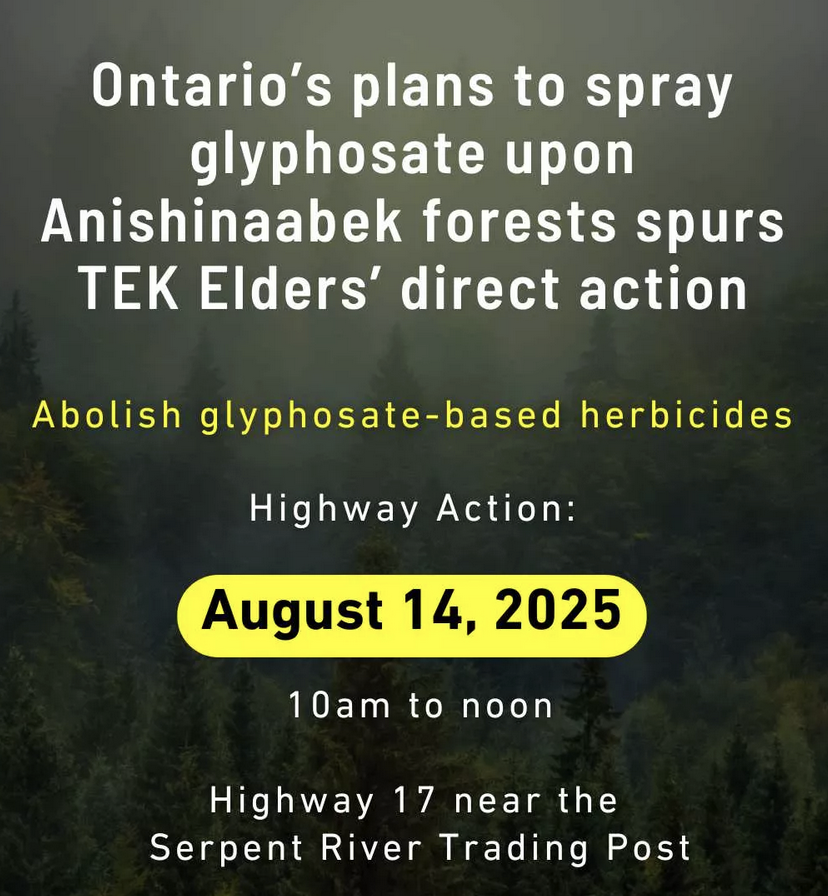 The attack by the government of Ontario on our Anishinaabek way of life along the North Shore of the Great Lakes continues. In the latest assault, the Ontario Ministry of Natural Resources has given only weeks’ notice of a devastating aerial herbicide spray operation taking place between August 18 and September 30 across Anishinaabek lands near Elliot Lake, Blind River and Espanola.
The attack by the government of Ontario on our Anishinaabek way of life along the North Shore of the Great Lakes continues. In the latest assault, the Ontario Ministry of Natural Resources has given only weeks’ notice of a devastating aerial herbicide spray operation taking place between August 18 and September 30 across Anishinaabek lands near Elliot Lake, Blind River and Espanola.The operation will douse over 4,500 hectares in a commercial formulation containing the herbicide glyphosate. Similar operations are planned across other forest management areas.
This herbicide impacts aquatic life, and kills blueberries and other crucial foods, medicines, and tree species necessary to forest life. In response, the Traditional Ecological Knowledge Elders in the Robinson Huron Treaty Territory are taking action along Highway 17 which runs east-west along the North Shore of Lake Huron.
 The action will take place August 14th, 2025 from 10 a.m. to noon off Highway 17 near the Serpent River Trading Post.
The action will take place August 14th, 2025 from 10 a.m. to noon off Highway 17 near the Serpent River Trading Post.The Traditional Ecological Knowledge Elders (TEK Elders) have called for this action in response to recent reporting in Soo Today July 22 by Greg McGrath-Goudie. “They don’t listen,” TEK Elder Joe Jones said about the Ministry’s announcement. “We’ve been telling them for years this spraying is affecting all our relations; it is killing our Anishinaabek way of life.
TEK Elders began a campaign to end glyphosate-based herbicide use permitted in Ontario forestry over a decade ago. Joe Jones and other knowledge holders have observed dramatic changes in moose, deer, muskrat, and other forest life as jack pine plantations began replacing mixed forests with the help of glyphosate-based herbicide use.
Officials quoted by McGrath-Goudie including MNR spokesperson Mike Fenn claim the herbicide is necessary to “control competing vegetation” and that “re-establishing conifer forests supports biodiversity, provides wildlife habitat, and helps meet long-term wood supply needs.” Fenn claimed in the Soo Today article that glyphosate-based herbicide “doesn’t build up in the environment and breaks down after it sticks to plants or soil,” and that only certain areas will be subject to the project.
Elder Caroline Recollet (Wahnapitae First Nation), spokesperson for the TEK Elders “Stop the Spray” Campaign, rejects the Ontario Ministry of Natural Resources’ claims about the “need” for herbicide “management,” and reminds us that TEK Elders founder Raymond Owl refers to aerial glyphosate use as “raining poison from the sky.”
“Ontario has an obligation to respect our Treaty rights,” said Elder Caroline Recollet. “When forests are converted to plantations, all life is affected – we share these lands with all creation.”
Chiefs of Ontario released a statement July 31, 2025, informing the MNR that all 40 First Nations have come to consensus to reject glyphosate use in forestry across all First Nations’ lands. The Chiefs of Ontario have taken up the campaign on the TEK Elders’ behalf, and a number of Chiefs have been invited to join the action on August 14th.
TEK Elders are calling on all concerned community members to stand up and reject these assaults on our forests. When discussing the context for the Highway 17 action, Elder Caroline Recollet points out this forest conversion affects us all – the Anishinaabe, settler descended, and our more than human relatives.
The current western science does not support the MNR’s claims of safety and necessity: “Our friends at Safe Food Matters and other international partners have been working on a Global Glyphosate Review for the past 5 years that supports what we Anishinaabek knowledge holders have been saying since Raymond Owl first rallied us together – this entire approach of relying on herbicides in forestry harms our way of life.”
Mary Lou McDonald of Safe Food Matters also rejects the MNR’s claims of safety. Safe Food Matters recently released a Forestry and Food Report in which they found the agency responsible for approving glyphosate failed to account for the frequency of use as well as the impact on forest foods for indigenous peoples and the non-human populations with whom indigenous peoples including the Anishinaabek share forested watersheds.
Maureen Hutchinson-Parker from Ontario Stop the Spray will be joining the TEK Elders on August 14th, bringing support from this grassroots organization of concerned citizens across the province. “As a people living in these lands we all rely on healthy forests for our well-being. The MNR cannot claim this practice is either safe or necessary with the amount of evidence we have to the contrary. It is time to stop the spray!”
Maps and project details are available to the public through the Natural Resources Information Portal.
Information on TEK Elders at tekelders.ca
Information on Stop the Spray campaigns at https://stopthespraycanada.ca/scandal/
Latest posts by This Media Release (see all)
- Ladies Curling Standings – January 29 - January 29, 2026
- Sault Police Remind Snowmobilers: Stay Off Railway Tracks - January 29, 2026
- Public Webinar Today in advance of February 4 Public Comment Deadline for NWMO’s Deep Geological Repository Project - January 28, 2026
 Wawa-news.com Local and Regional News
Wawa-news.com Local and Regional News
I happened to hear a quick blurb on CBC radio about the spraying of glyphosates and then looked up this article for more info as my first reaction is a “round up’ type spray is a poison that quick kills a lot of things including beneficial plants and insects like bees! The people in charge of the spraying seem to be glossing over these facts and that it is a poison to humans and animals alike – hence part of the reason it is banned from everyday home use! Is there anything an average citizen can do to spread the word? Thank you, Tammy